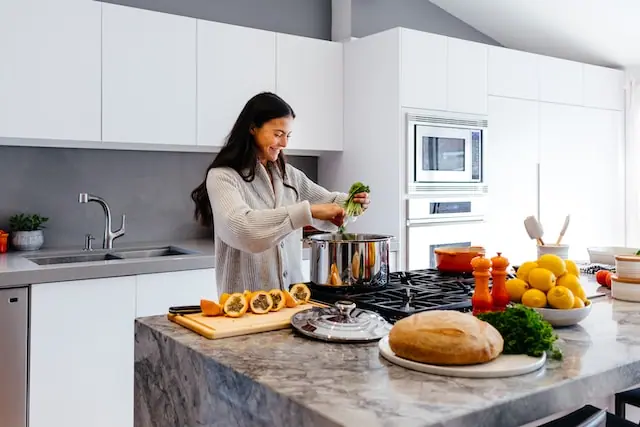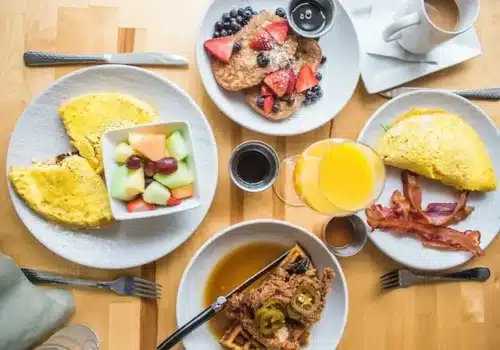
8 Tips For Beginner Home Chefs
Cooking at home may sound challenging, especially for those just starting out in the kitchen. With so many recipes, techniques, and gadgets out there, it’s easy to feel overwhelmed. However, home cooking doesn’t have to be difficult. In fact, many simple hacks and tips can make cooking much more easy and enjoyable for beginners.
According to The Food Institute, Gen Z claims to be a foodie generation, especially keen to learn cooking basics. Additionally, millennials are also spending less money dining out and more time experimenting at home, with 74% wishing they felt more confident in the kitchen.
Cooking at home is a great way to save money, eat healthier, and have more control over what you eat. Plus, it can be a fun and rewarding hobby.
So, if you’re also a beginner cook trying to build the habit of eating more at home, here are some foolproof tips for getting started.
1. Learn How to Cook Meat
Cooking meat properly helps avoid foodborne illness. A meat thermometer is a good tool for beginners, as it ensures that meats like beef, pork, and poultry reach safe internal temperatures. Chicken should reach 165°F, ground beef 160°F, and pork 145°F.
For those who enjoy steaks but don’t want to spend a lot of money on eating out every time, learning how to cook a steak in a pan can be a game-changer, ensuring a delicious sear while maintaining the desired doneness. Let roasts, larger cuts of beef, and lamb rest for 10 minutes before slicing to retain juices.
2. Master Basic Cooking Methods
Learning a few fundamental cooking tips for beginners techniques opens up endless meal possibilities. Start with sautéing aromatics like onion and garlic as a flavor base and understand how to boil, simmer, pan-fry, roast, and bake foods using oil, heat, and oven temperatures correctly. Don’t be afraid to experiment!
Taste as you go and adjust the seasoning. Skills like chopping, searing, and baking will become second nature with practice.
3. Cook Easy One-Pot Meals
For new cooks short on time, simple one-pot meals are a lifesaver. Toss ingredients like canned beans, veggies, broth, and protein into a Dutch oven or skillet for fast stovetop meals or bake casserole-style dishes in a baking dish. One-pot cooking means less cleanup and easy prep.
Try recipes like chili, risotto, mac and cheese, soups, stir-fries, and roasted veggies.
4. Master Breakfast Essentials
Cooking breakfast is the perfect way to gain confidence in the kitchen. Start with simple egg dishes like scrambled, fried, or an omelet with cheese or veggies.
Make pancakes, waffles, or French toast using a store-bought batter. You can also whip up a breakfast bowl by sautéing veggies, potatoes, and protein like sausage. And don’t forget coffee, orange juice, and fruit on the side!
5. Roast Sheet Pan Dinners
For easy cooking with minimal cleanup, sheet pan dinners are ideal for beginners. Arrange protein like chicken, sausage, or tofu and vegetables like broccoli, potatoes, carrots, or cauliflower on a rimmed baking sheet. Toss with oil and seasonings and roast at 400°F until cooked. Everything cooks together for a meal with just one pan to wash!
6. Master Marinades and Sauces
Elevate basic ingredients like chicken, fish, and veggies with flavor-packed marinades and sauces. A marinade of oil, acid like lemon juice or vinegar, and herbs adds lots of flavor. Quick pan sauces are also simple.
Sauté aromatics, then deglaze the pan with wine, broth, or water and reduce. Stir in some butter or cream at the end.
7. Equip Your Kitchen Correctly
A few essential tools in the kitchen will make cooking easier and more fun. Start with a good chef’s knife, cutting board, pots, mixing bowls, measuring cups, spoons, and baking sheets. Invest in solid mid-priced gear made from stainless steel or ceramic. Also, choose one versatile appliance like a food processor or immersion blender.
Read More: How to Optimize Your Kitchen for Enhanced Recipe Results
8. Stock Up on Staples
Keep your pantry and fridge stocked with versatile ingredients to assemble easy meals on busy nights. Staples like eggs, whole grains, canned beans, onions, garlic, olive oil, spices, and frozen veggies are nutrition-packed basics you can mix and match.
To save money, shop for shelf-stable items in bulk. Also, prep produce like onions ahead of time and store chopped portions for quick cooking.
Conclusion
Cooking at home regularly is good for your health, budget, and well-being. These tips give beginners cooking a strong foundation in the kitchen. You don’t need a lot of fancy equipment to cook at home; just make sure you have the basics. Start with proper gear and staple ingredients, and master basic cooking techniques through easy recipes. Prep ingredients in advance for efficient meal assembly. Most importantly, approach cooking with patience.
Before long, you’ll gain the confidence to make nourishing homemade meals.


